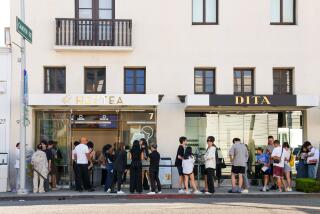Steeped in Tradition
- Share via
Did you know all tea comes from the same plant? Whether it’s in Lipton bags or the fancy loose-leaf oolong variety, all tea originates from a green bush called Camellia sinensis.
Also noteworthy is that the United States imports practically all of its tea, mostly from Argentina, and the quality isn’t that great.
There’s only one tea plantation in this country--in Charleston, S.C.,--and it serves mainly as a tourist attraction.
So, why, if Americans are drinking more tea than ever, is it not produced domestically?
“It’s very labor-intensive and there’s not a good dollar return,” said Ric Rhinehart, a tea expert and consultant to several companies.
If this information seems interesting and you’d like to learn more, join Rhinehart on Saturday at Descanso Gardens for an event called “Tea: From Leaf to Cup.”
Rhinehart, who has an engineering degree, got into the tea business about 10 years ago. Realizing that leaf tea was virtually nonexistent in this country, he created Paradise Tropical Tea.
As he became one of the largest buyers of premium tea in the U.S., top producers from around the world sent him samples. Tea samples still regularly arrive from Sri Lanka, India and East Africa, among other countries.
“It was also an incredible tea education for me,” Rhinehart said. “I have tasted the best.”
And now he’s considered a specialist who conducts workshops for those in the industry and training sessions for staff members of establishments that serve tea.
Rhinehart’s new book, “Tea Basics,” is scheduled for publication Nov. 20. Saturday he will share its contents and his expertise. There will also be samplings of premium teas from around the world.
Rhinehart will explain in detail how the Camellia sinensis bush is transformed into hundreds of different types of black, green and oolong teas.
Descanso Gardens has a Camellia sinensis bush in its renowned 35-acre camellia forest, which is considered one of the best camellia collections outside of China and one of the largest in North America.
“We’ve had it here for 20 to 30 years,” said Descanso Gardens spokeswoman Karen Dardick. “A lot of people have no idea it’s where tea comes from.”
Rhinehart encourages tea aficionados to check out the bush while at the garden because much of his presentation will feature botanical information. He will also explain processing methods and how each affects the taste of the finished product.
Rhinehart also will show scenic and colorful slides that, among other things, illustrate the vast tea gardens nestled in the foothills of the Himalayas in India.
“Some of these tea gardens are communities with 4,500 people living and working on them,” Rhinehart said. “The amount of labor that goes into producing a cup of tea is absolutely stunning.”
Rhinehart believes the best green tea is produced in China, the top oolong in Taiwan and the finest black tea in India. His favorite is oolong from Taiwan. He likes to keep about 60 varieties of tea at home because his wife, who also works in the tea industry, and four children love to drink it.
Some of it can be expensive. For example, a fancy oolong can sell for about $50 a pound wholesale. And Darjeeling, grown in the mountainous region of northeast India, can go for as much as $300 a pound.
Most Americans probably will never taste such fine teas, Rhinehart says, but that doesn’t mean they’re still consuming the less expensive varieties. He says consumption in the U.S. has increased significantly in the last three years.
“Of course, tea is not ever going to explode in this country the way coffee did,” Rhinehart said, “but it’s still a popular and healthy beverage.”
* Send Jaunts ideas, allowing at least two weeks’ notice, to staff writer Irene Garcia at The Times, 20000 Prairie St., Chatsworth 91311. Or send e-mail to Irene.Garcia@latimes.com.
BE THERE
Tea: From Leaf to Cup, at Descanso Gardens’ Van de Kamp Hall, Saturday at 10 a.m. The garden is at 1418 Descanso Drive in La Canada Flintridge. Cost is $15 and $10 for guild members. Information: (818) 952-4401.
More to Read
Sign up for The Wild
We’ll help you find the best places to hike, bike and run, as well as the perfect silent spots for meditation and yoga.
You may occasionally receive promotional content from the Los Angeles Times.






